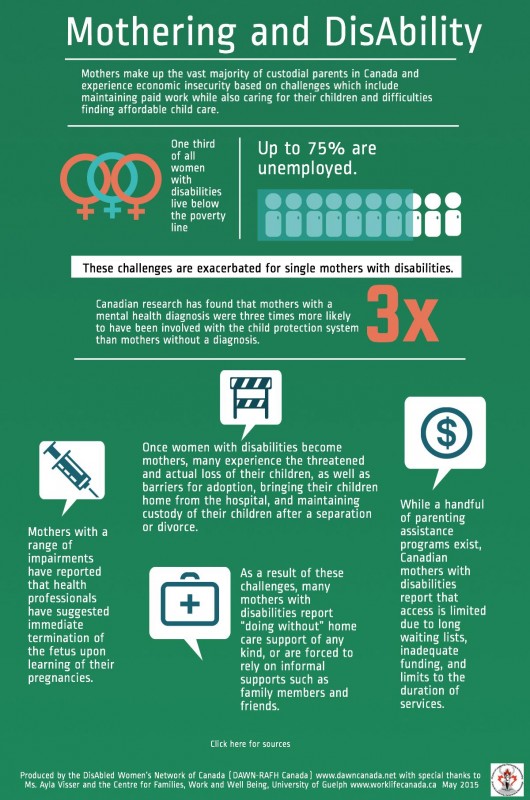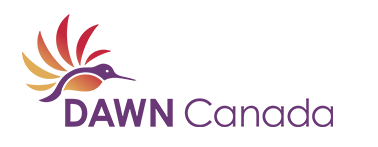Happy Mother's Day?

This year on Mothers Day DAWN-RAFH Canada, in collaboration with Guelph Universitys Centre for Families, Work and Well Being released Fast Facts on Mothering and DisAbility, the first in a series of pieces designed to raise awareness of the many issues and barriers that mothers with disabilities and Deaf mothers face.
On Sunday, Huffington Post also published an informative article on some of the challenges facing Parents with disabilities, featuring interviews with me and Jewelles Smith among others.
Several of our own staff here at DAWN-RAFH Canada are mothers and so weve also lived some of these challenges. Aisha Ka, our Administrative and Finance Coordinator is a Deaf woman. Aisha, who is presently on maternity leave, described how different her experience of childbirth was with her first child, who was born before she received cochlear implants. No supports were provided to facilitate communication and she had to rely completely on her spouse to speak for her throughout the birthing experience and hospital stay.
In reality, very limited research on mothers with disabilities in Canada has been undertaken. There is an excellent report done by West Coast LEAF in 2014 entitled ABLE MOTHERS: The intersection of parenting, disability, & the law which provides a holistic view of the many barriers that women with disabilities experience and that place them and their children at risk in the context of child custody and parental rights.
And there has been some good qualitative research done over the years, including DAWN-RAFH Canadas report, The Only Parent in the Neighborhood, but it had a broader focus and more recently DisAbled Mothering Building a Safer Community for Mothers with Disabilities by Jewelles Smith which was focused on access to shelters and transition houses.
Beyond that, there are a small number of individual academics and academic institutions who understand the importance of doing this research.
We also know there has been a response to some of the needs of mothers with disabilities in Ontario which we can assume to be largely attributable to the Accessibility for Ontarians with Disabilities Act (AODA)but its such a limited response and not based on a real understanding of this specific needs of mothers with disabilities.
At all three levels of government there are huge gaps in data collection and research and no policies to speak of. As a consequence there is little to no funding and few programs being directed at the problems.
And this is despite what we DO know from the data that does exist, which is that the very poorest women in Canada today are single mothers with disabilities. Instead of supporting these women by providing parenting assistance, adaptive tools and other resources, we assume they are inadequate parents and threaten to take their children away its shocking! from them instead of supporting them. Family Courts are backed up with something like 75% of people having to represent themselves because they cannot afford a lawyer.
The West Coast LEAF report sets the bar high, where it needs to be, with some clear direction in the area of parental and sexual and reproductive rights. Were really interested in the findings and recommendations and in including them in a national initiative that we are beginning this Mothers Day with the launch of Fast Facts on Mothering and Disability, which will be followed by a series of Information Sheets on Reproductive Rights, Mothering and Care Giving.
When we were preparing for the release of these Fast Facts we really struggled to find good things to share FOR moms!
We would love to hear FROM some of you Moms out there. So please share your thoughts, your good experiences and the changes you hope for.
Bonnie Brayton
National Executive Director, DAWN-RAFH Canada
